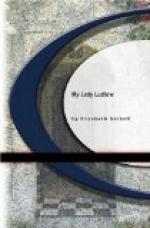“A very pretty young man, my dears,” said she, as we drove away. “But I shall have my pew glazed all the same.”
We did not know what she meant at the time; but the next Sunday but one we did. She had the curtains all round the grand old Hanbury family seat taken down, and, instead of them, there was glass up to the height of six or seven feet. We entered by a door, with a window in it that drew up or down just like what you see in carriages. This window was generally down, and then we could hear perfectly; but if Mr. Gray used the word “Sabbath,” or spoke in favour of schooling and education, my lady stepped out of her corner, and drew up the window with a decided clang and clash.
I must tell you something more about Mr. Gray. The presentation to the living of Hanbury was vested in two trustees, of whom Lady Ludlow was one: Lord Ludlow had exercised this right in the appointment of Mr. Mountford, who had won his lordship’s favour by his excellent horsemanship. Nor was Mr. Mountford a bad clergyman, as clergymen went in those days. He did not drink, though he liked good eating as much as any one. And if any poor person was ill, and he heard of it, he would send them plates from his own dinner of what he himself liked best; sometimes of dishes which were almost as bad as poison to sick people. He meant kindly to everybody except dissenters, whom Lady Ludlow and he united in trying to drive out of the parish; and among dissenters he particularly abhorred Methodists—some one said, because John Wesley had objected to his hunting. But that must have been long ago for when I knew him he was far too stout and too heavy to hunt; besides, the bishop of the diocese disapproved of hunting, and had intimated his disapprobation to the clergy. For my own part, I think a good run would not have come amiss, even in a moral point of view, to Mr. Mountford. He ate so much, and took so little exercise, that we young women often heard of his being in terrible passions with his servants, and the sexton and clerk. But they none of them minded him much, for he soon came to himself, and was sure to make them some present or other—some said in proportion to his anger; so that the sexton, who was a bit of a wag (as all sextons are, I think), said that the vicar’s saying, “The Devil take you,” was worth a shilling any day, whereas “The Deuce” was a shabby sixpenny speech, only fit for a curate.
There was a great deal of good in Mr. Mountford, too. He could not bear to see pain, or sorrow, or misery of any kind; and, if it came under his notice, he was never easy till he had relieved it, for the time, at any rate. But he was afraid of being made uncomfortable; so, if he possibly could, he would avoid seeing any one who was ill or unhappy; and he did not thank any one for telling him about them.




